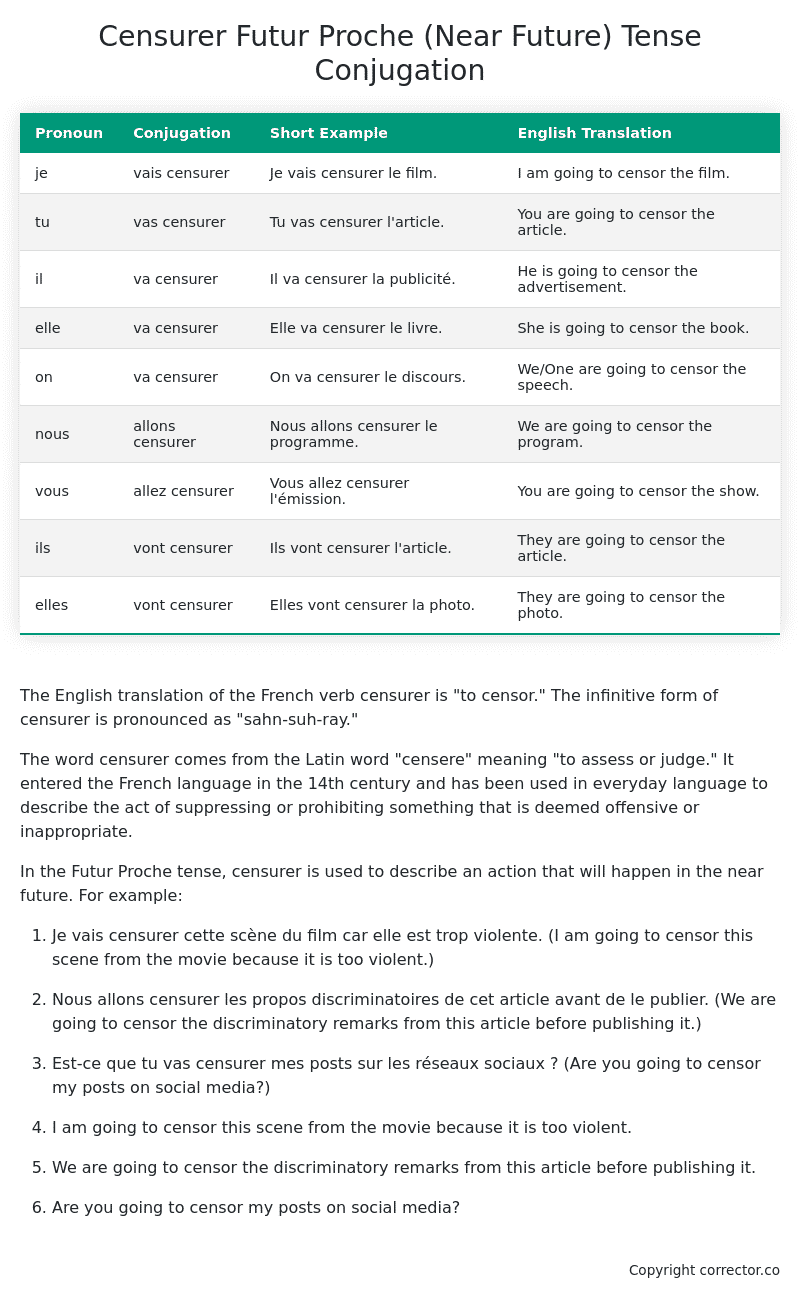Futur Proche (Near Future) Tense Conjugation of the French Verb censurer
Introduction to the verb censurer
The English translation of the French verb censurer is “to censor.” The infinitive form of censurer is pronounced as “sahn-suh-ray.”
The word censurer comes from the Latin word “censere” meaning “to assess or judge.” It entered the French language in the 14th century and has been used in everyday language to describe the act of suppressing or prohibiting something that is deemed offensive or inappropriate.
In the Futur Proche tense, censurer is used to describe an action that will happen in the near future. For example:
-
Je vais censurer cette scène du film car elle est trop violente. (I am going to censor this scene from the movie because it is too violent.)
-
Nous allons censurer les propos discriminatoires de cet article avant de le publier. (We are going to censor the discriminatory remarks from this article before publishing it.)
-
Est-ce que tu vas censurer mes posts sur les réseaux sociaux ? (Are you going to censor my posts on social media?)
-
I am going to censor this scene from the movie because it is too violent.
-
We are going to censor the discriminatory remarks from this article before publishing it.
-
Are you going to censor my posts on social media?
Table of the Futur Proche (Near Future) Tense Conjugation of censurer
| Pronoun | Conjugation | Short Example | English Translation |
|---|---|---|---|
| je | vais censurer | Je vais censurer le film. | I am going to censor the film. |
| tu | vas censurer | Tu vas censurer l’article. | You are going to censor the article. |
| il | va censurer | Il va censurer la publicité. | He is going to censor the advertisement. |
| elle | va censurer | Elle va censurer le livre. | She is going to censor the book. |
| on | va censurer | On va censurer le discours. | We/One are going to censor the speech. |
| nous | allons censurer | Nous allons censurer le programme. | We are going to censor the program. |
| vous | allez censurer | Vous allez censurer l’émission. | You are going to censor the show. |
| ils | vont censurer | Ils vont censurer l’article. | They are going to censor the article. |
| elles | vont censurer | Elles vont censurer la photo. | They are going to censor the photo. |
Other Conjugations for Censurer.
Le Present (Present Tense) Conjugation of the French Verb censurer
Imparfait (Imperfect) Tense Conjugation of the French Verb censurer
Passé Simple (Simple Past) Tense Conjugation of the French Verb censurer
Passé Composé (Present Perfect) Tense Conjugation of the French Verb censurer
Futur Simple (Simple Future) Tense Conjugation of the French Verb censurer
Futur Proche (Near Future) Tense Conjugation of the French Verb censurer (this article)
Plus-que-parfait (Pluperfect) Tense Conjugation of the French Verb censurer
Passé Antérieur (Past Anterior) Tense Conjugation of the French Verb censurer
Futur Antérieur (Future Anterior) Tense Conjugation of the French Verb censurer
Subjonctif Présent (Subjunctive Present) Tense Conjugation of the French Verb censurer
Subjonctif Passé (Subjunctive Past) Tense Conjugation of the French Verb censurer
Subjonctif Imparfait (Subjunctive Imperfect) Tense Conjugation of the French Verb censurer
Subjonctif Plus-que-parfait (Subjunctive Pluperfect) Tense Conjugation of the French Verb censurer
Conditionnel Présent (Conditional Present) Tense Conjugation of the French Verb censurer
Conditionnel Passé (Conditional Past) Tense Conjugation of the French Verb censurer
L’impératif Présent (Imperative Present) Tense Conjugation of the French Verb censurer
L’infinitif Présent (Infinitive Present) Tense Conjugation of the French Verb censurer
Struggling with French verbs or the language in general? Why not use our free French Grammar Checker – no registration required!
Get a FREE Download Study Sheet of this Conjugation 🔥
Simply right click the image below, click “save image” and get your free reference for the censurer Futur Proche tense conjugation!

Censurer – About the French Futur Proche (Near Future) Tense
Formation
1. Conjugate “aller” in the present tense according to the subject pronoun:
2. Add the infinitive of the main verb immediately after “aller.” For example:
Common Everyday Usage
Interactions with Other Tenses
Present Tense
Past Tense
Conditional Tense
Summary
I hope you enjoyed this article on the verb censurer. Still in a learning mood? Check out another TOTALLY random French verb conjugation!


